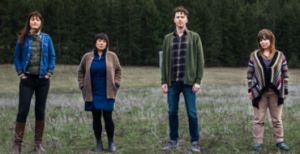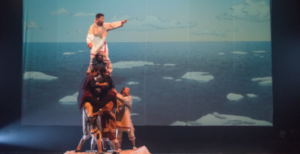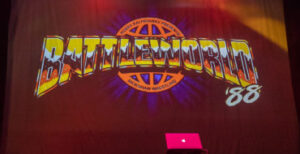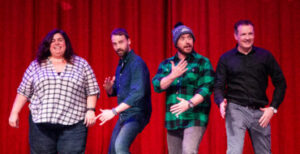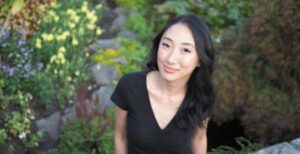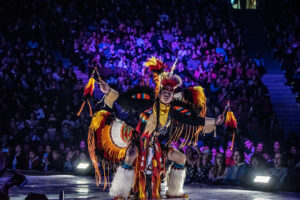
Have you ever seen slam poetry in Vancouver? And by that, I mean, have you ever
seen slam poetry in Vancouver? Not over beers during that one terrible date or as an unexpected pause on a late night bar hop down the Drive, but sat rapt five feet from a red-lit stage, entirely consumed by the performer and performance?
Have you sat in a theatre full of rowdy young and young-at-heart poets, of artists and dreamers and general merrymakers as they are utterly engulfed with you?
No, you say? Well, why the hell not?
The reasons you ought to are innumerable, but for brevity’s sake I’ll stick to the basics. The number one reason is that the Second Annual Vancouver International Poetry Festival (V.I.P.F.) is on this week, drawing poets and poetry lovers from all over Canada for a wild kaleidoscope of creativity and performance. Last night, the Rio played host to the opening event, Van Slam Finals Night featuring Ian Keteku.
It is, perhaps, a little odd that a festival might begin with finals, but the showcase presented an introduction to some of this city’s finest young spoken word artists. East Van institution Vancouver Poetry Slam took the evening to close out their season with eight young poets vying for a spot on this year’s Vancouver Poetry Slam Team. The team will be traveling to Paris later this year for the World Poetry Slam Championship. Ian Keteku, 2010 world champion, was on hand to give a mid-show performance.
More on the Keteku and the Esteemed Eight in a moment but first, I want to set the scene for you:
A poetry slam is not a sterile thing. It’s rough and it’s noisy and merely polite applause is unorthodox. That said, the rambunctious stirrings of the crowd are anything but disrespectful. It’s a bit like heckling, but in reverse: the vociferations from the peanut(/hazelnut/walnut/generally nuts) gallery range from encouraging (“You’re hot!”) to non sequitur (“You make great soup!”), but are never disparaging or unfriendly.
Respect is the oil that makes the creative machine function properly, that allows these artists to bare their words and souls before a roomful of strangers. This in turn informs the citizenry of slam’s interactions with the community at large, and to this end, V.I.P.F. saw fit to inaugurate the week’s festivities with songs and a prayer from Doug Nickel, representing the Squamish nation. The reminder that our community exists on Squamish land was a powerful induction to a festival celebrating voices reclaimed by the voiceless.
And what voices! The one most often heard was that of the evening’s emcee, American poet Might Mike McGee. Crass and jocular, McGee discharged his duties in a way that was affable, comical and terrifically personal. His interstitial musings were in themselves an engaging part of the production as a whole.
After some warming up, some love shown to departing Vancouver Slam Masters Sean McGarragle and Duncan Shields and an introduction to the judges, we were ready to get underway.
All poets read three poems, one for each round, varying in length from three minutes (for the first and last rounds) to one (the second round). All were local and many, it seemed, were residents of East Van (as were, judging by the cheers for neighborhood shout-outs, many audience members). Slips of paper in a plastic bowl served for a randomization of the performance order and each piece was punctuated by scraps of up-tempo beats from the likes of Beck and the Go! Team.
The poets (Erin Kirsh, Julie Peters, Zaccheus Jackson, Lisa B, Erich Haygun, Rupert Common, Jillian Christmas and Fernando Paguero) were a generally impressive bunch. Obviously, going into the specifics of each round would be incredibly tedious for both you and your dogged reporter, so suffice to say that each presented a rollicking patchwork of style and form. Some sang, some rapped, a few nearly cried.
Subject matter drifted from gender politics and clean sheets to lost love and serial killers; spiders, cities and Dungeons and Dragon; birds, veganism and toilet paper.
There were powerful, tearful moments (Lisa B’s one-minute piece on sexual consent had your reporter near sobbing) and countless silly ones (the final poem of the night, Paguero’s “Muffin Shop,” had everyone all a-titter).
It’s precisely these fluctuations of gravity and levity, the oscillation of emotion that makes slam poetry such a dynamic art form. The poets bring not only the fervent ambit of feeling, but a profound exploration of personal experience to the stage. The performances are raw and uncompromising; oddly intoxicating and unimaginably brave.
The victorious performer of the night was Jillian Christmas, who embodied this adamant courage throughout all three of her works. She’s a powerful performer—vulnerable yet tough-as-nails and at times, heartbreakingly cynical—and promises to be a fantastic addition to the Vancouver Slam Team. First-place runner up and alternate was Julie Peters, whose pieces ran the gamut from astonishingly sad to skin-crawlingly scary. Revolution-minded Zaccheus Jackson and choleric Erich Haygun came in second and third, respectively.
If you haven’t seen slam poetry done well yet, this is precisely why you should: In age of curated personalities and carefully crafted faces, it’s refreshing to see something so unvarnished, so resolutely
real and so very unlike the affectations we arm ourselves with daily. The heartbreak, the assault, the abundant joy and the most eldritch terrors are revealed and relived onstage, completely uncomplicated by the dissimulation of pretending that everything is just okay.
The tension of the human and the technological was on pointed display during Ian Keteku’s impressive mid-performance set. His first poem used vocal distortions and an iPad synthesizer in a technique that was eerily robotic but lent a new power to Keteku’s undistorted voice.
Keteku’s short set illustrated the variation available to the innovative poet: in addition to fancy electronic stylings, Keteku also brought up fellow Ottawa poet Brad Morden and gave us a taste of “folk hop poetry,” a singular marriage of folk-inspired musicality from Morden and his ukulele and Keteku’s dizzying rhymes. He and Morden finished out his set with the fabulously paradoxical “Right Side Up,” which Keteku performs in a yogic tripod (from the reporter’s notebook: “He’s fucking upside down!!!”).
So I suppose I have to ask again: Have you seen slam poetry? Have you been swept off your feet by the rawness of humanity, of the wildness of artistry and the exuberance of performance? If not, this week is your chance to see some of Canada’s best spoken word talents in Vancouver. There will be shows, parties, music, workshops and words by the barrelful.
Tomorrow, Café Deux Soleil will be hosting Mashed Poetics, a group of thirteen poets performing new works that interact with the Beastie Boys’ “License to Ill.” There are events every day until Sunday, when the festival will culminate in the Canadian Individual Slam Poetry Finals. Your indefatigable reporter will be attending as many as she can, keeping you abreast of the goings-on around the festival.
 Have you ever seen slam poetry in Vancouver? And by that, I mean, have you ever seen slam poetry in Vancouver? Not over beers during that one terrible date or as an unexpected pause on a late night bar hop down the Drive, but sat rapt five feet from a red-lit stage, entirely consumed by the performer and performance?
Have you sat in a theatre full of rowdy young and young-at-heart poets, of artists and dreamers and general merrymakers as they are utterly engulfed with you?
No, you say? Well, why the hell not?
The reasons you ought to are innumerable, but for brevity’s sake I’ll stick to the basics. The number one reason is that the Second Annual Vancouver International Poetry Festival (V.I.P.F.) is on this week, drawing poets and poetry lovers from all over Canada for a wild kaleidoscope of creativity and performance. Last night, the Rio played host to the opening event, Van Slam Finals Night featuring Ian Keteku.
It is, perhaps, a little odd that a festival might begin with finals, but the showcase presented an introduction to some of this city’s finest young spoken word artists. East Van institution Vancouver Poetry Slam took the evening to close out their season with eight young poets vying for a spot on this year’s Vancouver Poetry Slam Team. The team will be traveling to Paris later this year for the World Poetry Slam Championship. Ian Keteku, 2010 world champion, was on hand to give a mid-show performance.
More on the Keteku and the Esteemed Eight in a moment but first, I want to set the scene for you:
A poetry slam is not a sterile thing. It’s rough and it’s noisy and merely polite applause is unorthodox. That said, the rambunctious stirrings of the crowd are anything but disrespectful. It’s a bit like heckling, but in reverse: the vociferations from the peanut(/hazelnut/walnut/generally nuts) gallery range from encouraging (“You’re hot!”) to non sequitur (“You make great soup!”), but are never disparaging or unfriendly.
Respect is the oil that makes the creative machine function properly, that allows these artists to bare their words and souls before a roomful of strangers. This in turn informs the citizenry of slam’s interactions with the community at large, and to this end, V.I.P.F. saw fit to inaugurate the week’s festivities with songs and a prayer from Doug Nickel, representing the Squamish nation. The reminder that our community exists on Squamish land was a powerful induction to a festival celebrating voices reclaimed by the voiceless.
And what voices! The one most often heard was that of the evening’s emcee, American poet Might Mike McGee. Crass and jocular, McGee discharged his duties in a way that was affable, comical and terrifically personal. His interstitial musings were in themselves an engaging part of the production as a whole.
After some warming up, some love shown to departing Vancouver Slam Masters Sean McGarragle and Duncan Shields and an introduction to the judges, we were ready to get underway.
All poets read three poems, one for each round, varying in length from three minutes (for the first and last rounds) to one (the second round). All were local and many, it seemed, were residents of East Van (as were, judging by the cheers for neighborhood shout-outs, many audience members). Slips of paper in a plastic bowl served for a randomization of the performance order and each piece was punctuated by scraps of up-tempo beats from the likes of Beck and the Go! Team.
The poets (Erin Kirsh, Julie Peters, Zaccheus Jackson, Lisa B, Erich Haygun, Rupert Common, Jillian Christmas and Fernando Paguero) were a generally impressive bunch. Obviously, going into the specifics of each round would be incredibly tedious for both you and your dogged reporter, so suffice to say that each presented a rollicking patchwork of style and form. Some sang, some rapped, a few nearly cried.
Subject matter drifted from gender politics and clean sheets to lost love and serial killers; spiders, cities and Dungeons and Dragon; birds, veganism and toilet paper.
There were powerful, tearful moments (Lisa B’s one-minute piece on sexual consent had your reporter near sobbing) and countless silly ones (the final poem of the night, Paguero’s “Muffin Shop,” had everyone all a-titter).
It’s precisely these fluctuations of gravity and levity, the oscillation of emotion that makes slam poetry such a dynamic art form. The poets bring not only the fervent ambit of feeling, but a profound exploration of personal experience to the stage. The performances are raw and uncompromising; oddly intoxicating and unimaginably brave.
The victorious performer of the night was Jillian Christmas, who embodied this adamant courage throughout all three of her works. She’s a powerful performer—vulnerable yet tough-as-nails and at times, heartbreakingly cynical—and promises to be a fantastic addition to the Vancouver Slam Team. First-place runner up and alternate was Julie Peters, whose pieces ran the gamut from astonishingly sad to skin-crawlingly scary. Revolution-minded Zaccheus Jackson and choleric Erich Haygun came in second and third, respectively.
If you haven’t seen slam poetry done well yet, this is precisely why you should: In age of curated personalities and carefully crafted faces, it’s refreshing to see something so unvarnished, so resolutely real and so very unlike the affectations we arm ourselves with daily. The heartbreak, the assault, the abundant joy and the most eldritch terrors are revealed and relived onstage, completely uncomplicated by the dissimulation of pretending that everything is just okay.
The tension of the human and the technological was on pointed display during Ian Keteku’s impressive mid-performance set. His first poem used vocal distortions and an iPad synthesizer in a technique that was eerily robotic but lent a new power to Keteku’s undistorted voice.
Keteku’s short set illustrated the variation available to the innovative poet: in addition to fancy electronic stylings, Keteku also brought up fellow Ottawa poet Brad Morden and gave us a taste of “folk hop poetry,” a singular marriage of folk-inspired musicality from Morden and his ukulele and Keteku’s dizzying rhymes. He and Morden finished out his set with the fabulously paradoxical “Right Side Up,” which Keteku performs in a yogic tripod (from the reporter’s notebook: “He’s fucking upside down!!!”).
So I suppose I have to ask again: Have you seen slam poetry? Have you been swept off your feet by the rawness of humanity, of the wildness of artistry and the exuberance of performance? If not, this week is your chance to see some of Canada’s best spoken word talents in Vancouver. There will be shows, parties, music, workshops and words by the barrelful.
Tomorrow, Café Deux Soleil will be hosting Mashed Poetics, a group of thirteen poets performing new works that interact with the Beastie Boys’ “License to Ill.” There are events every day until Sunday, when the festival will culminate in the Canadian Individual Slam Poetry Finals. Your indefatigable reporter will be attending as many as she can, keeping you abreast of the goings-on around the festival.
Have you ever seen slam poetry in Vancouver? And by that, I mean, have you ever seen slam poetry in Vancouver? Not over beers during that one terrible date or as an unexpected pause on a late night bar hop down the Drive, but sat rapt five feet from a red-lit stage, entirely consumed by the performer and performance?
Have you sat in a theatre full of rowdy young and young-at-heart poets, of artists and dreamers and general merrymakers as they are utterly engulfed with you?
No, you say? Well, why the hell not?
The reasons you ought to are innumerable, but for brevity’s sake I’ll stick to the basics. The number one reason is that the Second Annual Vancouver International Poetry Festival (V.I.P.F.) is on this week, drawing poets and poetry lovers from all over Canada for a wild kaleidoscope of creativity and performance. Last night, the Rio played host to the opening event, Van Slam Finals Night featuring Ian Keteku.
It is, perhaps, a little odd that a festival might begin with finals, but the showcase presented an introduction to some of this city’s finest young spoken word artists. East Van institution Vancouver Poetry Slam took the evening to close out their season with eight young poets vying for a spot on this year’s Vancouver Poetry Slam Team. The team will be traveling to Paris later this year for the World Poetry Slam Championship. Ian Keteku, 2010 world champion, was on hand to give a mid-show performance.
More on the Keteku and the Esteemed Eight in a moment but first, I want to set the scene for you:
A poetry slam is not a sterile thing. It’s rough and it’s noisy and merely polite applause is unorthodox. That said, the rambunctious stirrings of the crowd are anything but disrespectful. It’s a bit like heckling, but in reverse: the vociferations from the peanut(/hazelnut/walnut/generally nuts) gallery range from encouraging (“You’re hot!”) to non sequitur (“You make great soup!”), but are never disparaging or unfriendly.
Respect is the oil that makes the creative machine function properly, that allows these artists to bare their words and souls before a roomful of strangers. This in turn informs the citizenry of slam’s interactions with the community at large, and to this end, V.I.P.F. saw fit to inaugurate the week’s festivities with songs and a prayer from Doug Nickel, representing the Squamish nation. The reminder that our community exists on Squamish land was a powerful induction to a festival celebrating voices reclaimed by the voiceless.
And what voices! The one most often heard was that of the evening’s emcee, American poet Might Mike McGee. Crass and jocular, McGee discharged his duties in a way that was affable, comical and terrifically personal. His interstitial musings were in themselves an engaging part of the production as a whole.
After some warming up, some love shown to departing Vancouver Slam Masters Sean McGarragle and Duncan Shields and an introduction to the judges, we were ready to get underway.
All poets read three poems, one for each round, varying in length from three minutes (for the first and last rounds) to one (the second round). All were local and many, it seemed, were residents of East Van (as were, judging by the cheers for neighborhood shout-outs, many audience members). Slips of paper in a plastic bowl served for a randomization of the performance order and each piece was punctuated by scraps of up-tempo beats from the likes of Beck and the Go! Team.
The poets (Erin Kirsh, Julie Peters, Zaccheus Jackson, Lisa B, Erich Haygun, Rupert Common, Jillian Christmas and Fernando Paguero) were a generally impressive bunch. Obviously, going into the specifics of each round would be incredibly tedious for both you and your dogged reporter, so suffice to say that each presented a rollicking patchwork of style and form. Some sang, some rapped, a few nearly cried.
Subject matter drifted from gender politics and clean sheets to lost love and serial killers; spiders, cities and Dungeons and Dragon; birds, veganism and toilet paper.
There were powerful, tearful moments (Lisa B’s one-minute piece on sexual consent had your reporter near sobbing) and countless silly ones (the final poem of the night, Paguero’s “Muffin Shop,” had everyone all a-titter).
It’s precisely these fluctuations of gravity and levity, the oscillation of emotion that makes slam poetry such a dynamic art form. The poets bring not only the fervent ambit of feeling, but a profound exploration of personal experience to the stage. The performances are raw and uncompromising; oddly intoxicating and unimaginably brave.
The victorious performer of the night was Jillian Christmas, who embodied this adamant courage throughout all three of her works. She’s a powerful performer—vulnerable yet tough-as-nails and at times, heartbreakingly cynical—and promises to be a fantastic addition to the Vancouver Slam Team. First-place runner up and alternate was Julie Peters, whose pieces ran the gamut from astonishingly sad to skin-crawlingly scary. Revolution-minded Zaccheus Jackson and choleric Erich Haygun came in second and third, respectively.
If you haven’t seen slam poetry done well yet, this is precisely why you should: In age of curated personalities and carefully crafted faces, it’s refreshing to see something so unvarnished, so resolutely real and so very unlike the affectations we arm ourselves with daily. The heartbreak, the assault, the abundant joy and the most eldritch terrors are revealed and relived onstage, completely uncomplicated by the dissimulation of pretending that everything is just okay.
The tension of the human and the technological was on pointed display during Ian Keteku’s impressive mid-performance set. His first poem used vocal distortions and an iPad synthesizer in a technique that was eerily robotic but lent a new power to Keteku’s undistorted voice.
Keteku’s short set illustrated the variation available to the innovative poet: in addition to fancy electronic stylings, Keteku also brought up fellow Ottawa poet Brad Morden and gave us a taste of “folk hop poetry,” a singular marriage of folk-inspired musicality from Morden and his ukulele and Keteku’s dizzying rhymes. He and Morden finished out his set with the fabulously paradoxical “Right Side Up,” which Keteku performs in a yogic tripod (from the reporter’s notebook: “He’s fucking upside down!!!”).
So I suppose I have to ask again: Have you seen slam poetry? Have you been swept off your feet by the rawness of humanity, of the wildness of artistry and the exuberance of performance? If not, this week is your chance to see some of Canada’s best spoken word talents in Vancouver. There will be shows, parties, music, workshops and words by the barrelful.
Tomorrow, Café Deux Soleil will be hosting Mashed Poetics, a group of thirteen poets performing new works that interact with the Beastie Boys’ “License to Ill.” There are events every day until Sunday, when the festival will culminate in the Canadian Individual Slam Poetry Finals. Your indefatigable reporter will be attending as many as she can, keeping you abreast of the goings-on around the festival. 